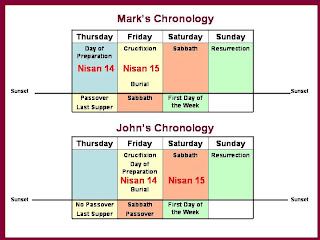The Gospel of John offers a different chronology of the Last Supper than Mark and the other synoptic gospels. For Mark, the setting for the supper is Passover (see Mark 14). For John, the supper is clearly not a Passover meal. And for John, there are no words of institution. The central focus is not the sacraments (there are none), but the act of foot washing. For John, the act of remembering Jesus is not accomplished by breaking bread and drinking wine as ritual, but by serving others (see John 13).
For a comparison of the two chronologies, see the chart below.
Monday, September 6, 2010
Days of Awe
This week begin the Days of Awe (or Days of Repentance) for the Jewish community. This period spans ten days, starting with Rosh Hashanah and ending with Yom Kippur. It is a time of introspection and of seeking reconciliation with people you have wronged. See more at Judaism 101.
- Rosh Hashandah - 9/9/2010
- Yom Kippur - 9/23/2010
Sunday, September 5, 2010
Historically-Conditioned Scriptures
How are extreme liberals and extreme fundamentalists alike? Larry Hurtado suggest both theological positions ignore the historically-conditioned nature of scripture as divine revelation. To read his thoughts on the mater, click here.
Jews for . . . ?
Here are two sites that are polar opposites: Jews for Jesus and Jews for Judaism.
Examine how both use scripture to support their belief that:
And it specifically calls our attention the concept of "covenant" and asks us to consider what being faithful to God means, whether Christian or Jew.
Examine how both use scripture to support their belief that:
- Jesus is the messiah (Jews for Jesus)
- Jesus is not the messiah (Jews for Judaism)
And it specifically calls our attention the concept of "covenant" and asks us to consider what being faithful to God means, whether Christian or Jew.
Subscribe to:
Posts (Atom)








